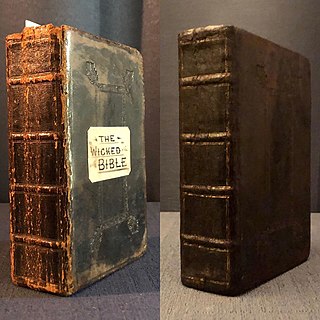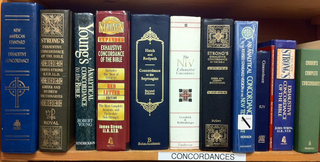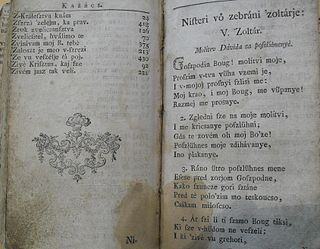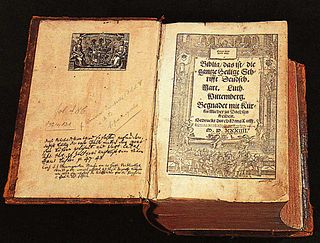
The King James Version (KJV), also the King James Bible (KJB) and the Authorized Version (AV), is an Early Modern English translation of the Christian Bible for the Church of England, which was commissioned in 1604 and published in 1611, by sponsorship of King James VI and I. The 80 books of the King James Version include 39 books of the Old Testament, 14 books of Apocrypha, and the 27 books of the New Testament.

The Great Bible of 1539 was the first authorised edition of the Bible in English, authorised by King Henry VIII of England to be read aloud in the church services of the Church of England. The Great Bible was prepared by Myles Coverdale, working under commission of Thomas Cromwell, Secretary to Henry VIII and Vicar General. In 1538, Cromwell directed the clergy to provide "one book of the Bible of the largest volume in English, and the same set up in some convenient place within the said church that ye have care of, whereas your parishioners may most commodiously resort to the same and read it."
This article is a summary of the literary events and publications of 1631.
Early Modern English Bible translations are those translations of the Bible which were made between about 1500 and 1800, the period of Early Modern English. This was the first major period of Bible translation into the English language including the King James Version and Douai Bibles. The Reformation and Counter-Reformation led to the need for Bibles in the vernacular with competing groups each producing their own versions.

Throughout history, printers' errors, unconventional translations and translation mistakes have appeared in a number of published Bibles. Bibles with features considered to be erroneous are known as Bible errata, and were often destroyed or suppressed due to their contents being considered heretical by some.

The Wicked Bible, sometimes called the Adulterous Bible or the Sinners' Bible, is an edition of the Bible published in 1631 by Robert Barker and Martin Lucas, the royal printers in London, meant to be a reprint of the King James Bible. The name is derived from a mistake made by the compositors: in the Ten Commandments in Exodus 20:14, the word "not" was omitted from the sentence, "Thou shalt not commit adultery".

A typographical error, also called a misprint, is a mistake made in the typing of printed or electronic material. Historically, this referred to mistakes in manual typesetting. Technically, the term includes errors due to mechanical failure or slips of the hand or finger, but excludes errors of ignorance, such as spelling errors, or changing and misuse of words such as "than" and "then". Before the arrival of printing, the copyist's mistake or scribal error was the equivalent for manuscripts. Most typos involve simple duplication, omission, transposition, or substitution of a small number of characters.
The Amplified Bible (AMP) is an English language translation of the Bible produced jointly by Zondervan and The Lockman Foundation. The first edition as a complete volume was published in 1965. "Amplifications" are words or phrases intended to more fully bring out the meaning of the original text but distinguished from the translation itself by a unique system of brackets, parentheses, and italics. The translation is largely one of formal equivalence (word-for-word).

A printer's devil was a young apprentice in a printing establishment who performed a number of tasks, such as mixing tubs of ink and fetching type. Notable writers including Benjamin Franklin, Walt Whitman, Ambrose Bierce, Bret Harte, and Mark Twain served as printer's devils in their youth along with indentured servants.

Matthew 5:27 and Matthew 5:28 are the twenty-seventh and twenty-eighth verses of the fifth chapter of the Gospel of Matthew in the New Testament and is part of the Sermon on the Mount. These verses begin the second antithesis: while since Matthew 5:21 the discussion has been on the commandment: "You shall not murder", it now moves to the commandment: "You shall not commit adultery".

The Ten Commandments, or the Decalogue, are religious and ethical directives, structured as a covenant document, that, according to the Hebrew Bible, are given by Yahweh to Moses. The text of the Ten Commandments was dynamic in ancient Israel and appears in three markedly distinct versions in the Bible: at Exodus 20:2–17, Deuteronomy 5:6–21, and the "Ritual Decalogue" of Exodus 34:11–26.
Matthew 15:19 is a verse in the fifteenth chapter of the Gospel of Matthew in the New Testament.
Events from the 1630s in England.
Events from the year 1631 in England.
Francis Constable was a London bookseller and publisher of the Jacobean and Caroline eras, noted for publishing a number of stage plays of English Renaissance drama.

A Bible concordance is a concordance, or verbal index, to the Bible. A simple form lists Biblical words alphabetically, with indications to enable the inquirer to find the passages of the Bible where the words occur.

"Thou shalt not commit adultery" is found in the Book of Exodus of the Hebrew Bible. It is considered the sixth commandment by Roman Catholic and Lutheran authorities, but the seventh by Jewish and most Protestant authorities. What constitutes adultery is not plainly defined in this passage of the Bible, and has been the subject of debate within Judaism and Christianity. The word fornication means illicit sex, prostitution, idolatry and lawlessness.

Psalm 5 is the fifth psalm of the Book of Psalms, beginning in English in the King James Version: "Give ear to my words, O LORD, consider my meditation". In Latin, it is known as "Verba mea auribus percipe Domine". The psalm is traditionally attributed to David. It reflects how the righteous man prays for deliverance not only for freedom from suffering, but to allow himself to serve God without distraction. The New King James Version entitles it "A Prayer for Guidance".

A Protestant Bible is a Christian Bible whose translation or revision was produced by Protestant Christians. Typically translated into a vernacular language, such Bibles comprise 39 books of the Old Testament and 27 books of the New Testament, for a total of 66 books. Some Protestants use Bibles which also include 14 additional books in a section known as the Apocrypha bringing the total to 80 books. This is in contrast with the 73 books of the Catholic Bible, which includes seven deuterocanonical books as a part of the Old Testament. The division between protocanonical and deuterocanonical books is not accepted by all Protestants who simply view books as being canonical or not and therefore classify books found in the Deuterocanon, along with other books, as part of the Apocrypha. Sometimes the term "Protestant Bible" is simply used as a shorthand for a bible which contains only the 66 books of the Old and New Testaments.

Christopher Barker (c.1529–1599) was the printer to Queen Elizabeth I. He was also the father of a printing dynasty that included his son Robert Barker, his grandsons Robert Constable and Francis Constable, and Richard Constable who is believed to be his grandson. He is most well-known for printing many editions of English Bibles during the Elizabethan Age, notably the Geneva Bible and the so-called Bishops' Bible. He was the official printer of the court of Elizabeth I of England and held exclusive patents to print Bibles.













